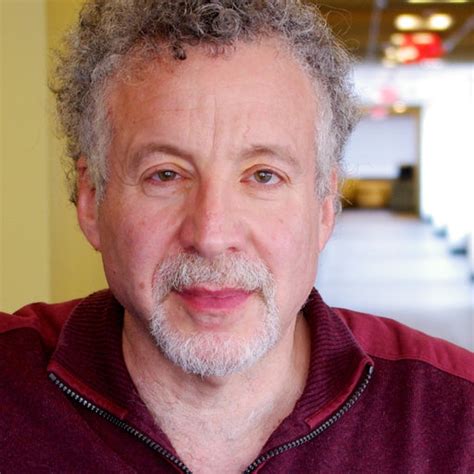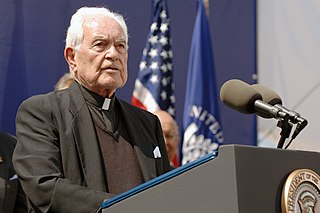Top 138 Theologian Quotes & Sayings - Page 3
Explore popular Theologian quotes.
Last updated on December 19, 2024.
Grace abounds in contemporary movies, books, novels, films and music. If God is not in the whirlwind, He may be in a Woody Allen film, or a Bruce Springsteen concert. Most people understand imagery and symbol better than doctrine and dogma. Images touch hearts and awaken imaginations. One theologian suggested that Springsteen's 'Tunnel of Love' album, in which he symbolically sings of sin, death, despair and redemption, is more important for Catholics than the Pope's last visit when he spoke of morality only in doctrinal propositions.
Al-Ghazali is the most important philosophical theologian of classical Islam, and Moderation in Belief is among his most important works. It sets out al-Ghazali's Ash?arite theology with unusual clarity and provides important background for such well-known works as his autobiographical Deliverance from Error and his attack on Avicenna in The Incoherence of the Philosophers. This first English-language translation, with notes that bring out the argumentation and background of the work, is thus very much to be welcomed.
I had NO interest in being a theologian, especially not a Christian, as I had been raised by progressive atheists. We bowed down every morning to the golden calf of the New York Times, Noam Chomsky, Hannah Arendt. I tried to get my parents to respect and nourish me, let alone delight in me, so even though I secretly loved and believed in the Divine Something - Goodness, Good Orderly Direction, Gift of Desperation, the Cosmic Muffin - I wasn't ready yet to commit myself to the study of a higher power.
I think nobody alive today is a more powerful agent of conversion than someone like Mother Teresa. You can refute arguments but not her life. When she came to the National Prayer Breakfast and lectured President Clinton about abortion, he had nothing to say to her. He can't argue with a saint. It's too bad there isn't an easier way, because becoming a saint is not the easiest thing in the world. It's much easier to become an apologist or a philosopher or a theologian.
You will find true success and happiness if you have only one goal, there really is only one, and that is this: to fulfill the highest most truthful expression of yourself as a human being. You want to max out your humanity by using your energy to lift yourself up, your family and the people around you. Theologian Howard Thurman said it best. He said, “Don’t ask yourself what the world needs. Ask yourself what makes you come alive and then go do that, because what the world needs is people who have come alive.”
Parental love is not contingent on the talents and attributes the child happens to have. We choose our friends and spouses at least partly on the basis of qualities we find attractive. But we do not choose our children. Their qualities are unpredictable, and even the most conscientious parents cannot be held wholly responsible for the kind of child they have. That is why parenthood, more than other human relationships, teaches what the theologian William F. May calls an “openness to the unbidden.
Whether we ever get to know about them or not, there are very probably alien civilizations that are superhuman, to the point of being god-like in ways that exceed anything a theologian could possibly imagine. Their technical achievements would seem as supernatural to us as ours would seem to a Dark Age peasant transported to the twenty-first century. Imagine his response to a laptop computer, a mobile telephone, a hydrogen bomb or a jumbo jet.
One day when Thomas Aquinas was preaching to the local populace on the love of God, he saw an old woman listening attentively to his every word. And inspired by her eagerness to learn more about her God whom she loved so dearly, he said to the people: It is better to be this unlearned woman, loving God with all her heart, than the most learned theologian lacking love.
If complex organisms demand an explanation, so does a complex designer. And it's no solution to raise the theologian's plea that God (or the Intelligent Designer) is simply immune to the normal demands of scientific explanation. To do so would be to shoot yourself in the foot. You cannot have it both ways. Either ID belongs in the science classroom, in which case it must submit to the discipline required of a scientific hypothesis. Or it does not, in which case, get it out of the science classroom and send it back to church, where it belongs.
God is the light shining in the midst of darkness, not to deny that there is darkness in the world but to reassure us that we do not have to be afraid of the darkness because darkness will always yield to light. As theologian David Griffin puts in, God is all-powerful, His power enables people to deal with events beyond their control and He gives us the strength to do those things because He is with us.
Only a God of love is fully personal. Thus the Trinity is crucial for maintaining a fully personal concept of God. As theologian Robert Letham writes, “Only a God who is triune can be personal.... A solitary monad cannot love and, since it cannot love, neither can it be a person.” Therefore it “has no way to explain or even to maintain human personhood.
It's clearly the case that there's not some moment in American history when every evangelical is holding hands with every Catholic who is holding hands with every mainline Methodist, or what have you. Obviously, American Christianity was deeply divided in all kinds of ways at mid-century too. But there was a kind of convergence going on. Even though Reinhold Niebuhr, the great mainline Protestant theologian, didn't think highly of Billy Graham, he and Graham still, clearly, had more in common, both theologically and in their attitudes toward religion in public life.
The medieval theologian who gazed at the night sky through the eyes of Aristotle and saw angels moving the spheres in harmony has become the modern cosmologist who gazes at the same sky through the eyes of Einstein and sees the hand of God not in angels but in the constants of nature. When confronted with the order and beauty of the universe and the strange coincidences of nature, it¹s very tempting to take the leap of faith from science into religion. I am sure many physicists want to. I only wish they would admit it.
Justification by grace through faith' is the theologian's learned phrase for what Chesterton once called 'the furious love of G-d.' He is not moody or capricious; He knows no seasons of change. He has a single relentless stance toward us: He loves us. He is the only G-d man has ever heard of who loves sinners. False gods- the gods of human manufacturing- despise sinners, but the Father of (Yeshua) loves all, no matter what they do.
We never really know what we want until after we get it. If after we get it, it makes life more miserable, we know that isn't what we wanted. If it makes our life wonderful, we know this is a strategy which will meet out need. That's why Paul Tillich, the theologian says we need to sin courageously. You ask for what you want, hoping to meet your needs. If you get it and it makes life worse, you learn that this isn't what I want.
Once He created the Big Bang... He could have envisioned it going in billions of directions as it evolved, including billions of life-forms and billions of kinds of intelligent beings. As a theologian, I would say that the proposed search for extraterrestrial intelligence (SETI) is also a search of knowing and understanding God through his works - especially those works that most reflect Him. Finding others than ourselves would mean knowing Him better.
Our starting-point must be the fact that God cannot be named... no mind has yet contained or language embraced God's substance in its fullness. No, we use facts connected with Him to outline qualities that correspond with Him, collecting a faint and feeble mental image from various quarters. Our noblest theologian is not one who has discovered the whole - our earthly shackles do not permit us the whole - but one whose mental image is by comparison fuller, who has gathered in his mind a richer picture, outline, or whatever we call it, of the truth.
The most curious social convention of the great age in which we live is the one to the effect that religious opinions should be respected. Its evil effects must be plain enough to everyone. All it accomplishes is (a) to throw a veil of sanctity about ideas that violate every intellectual decency, and (b) to make every theologian a sort of chartered libertine. No doubt it is mainly to blame for the appalling slowness with which really sound notions make their way in the world.















